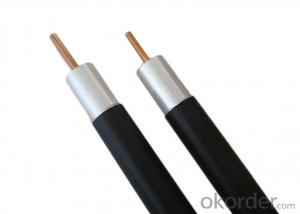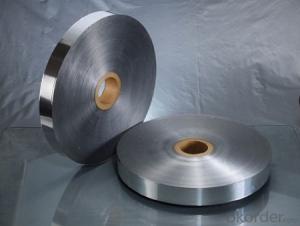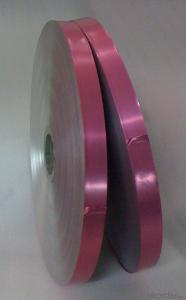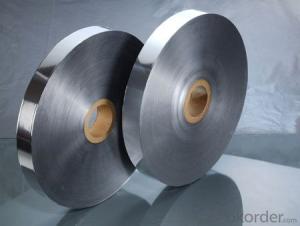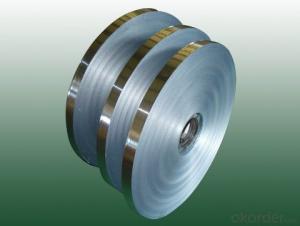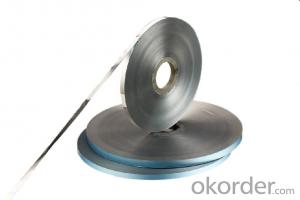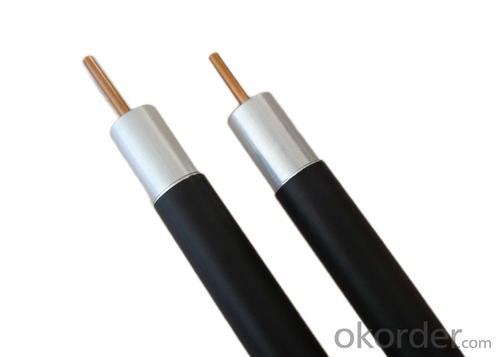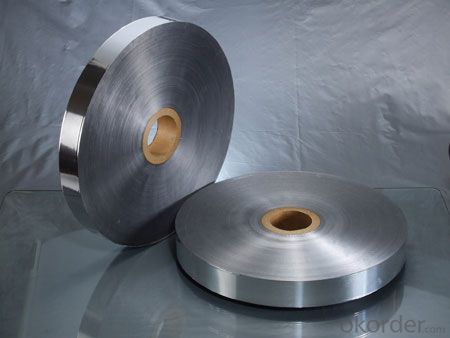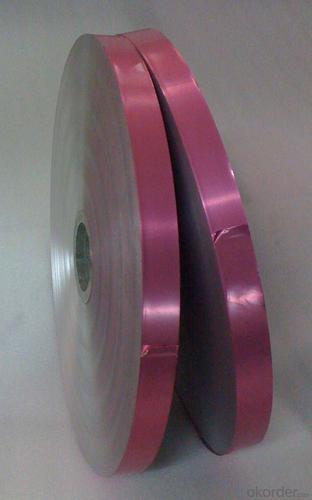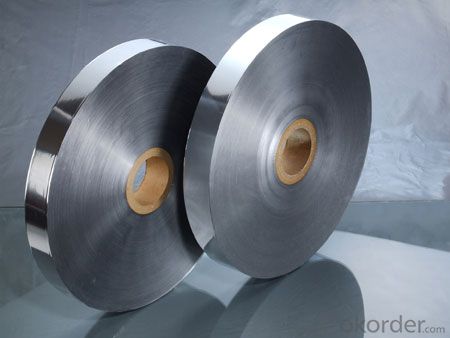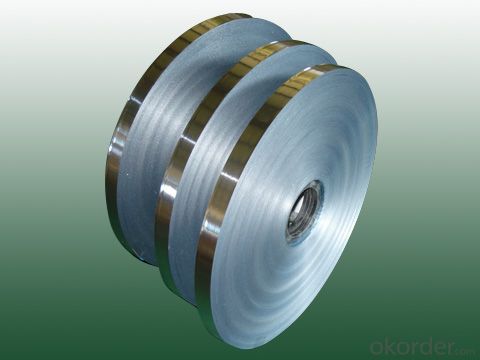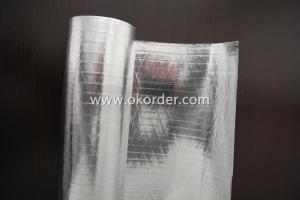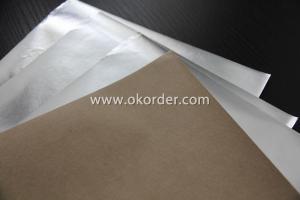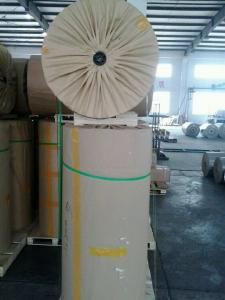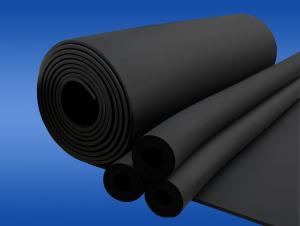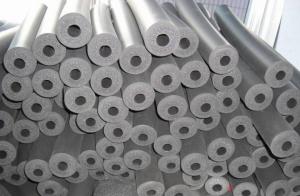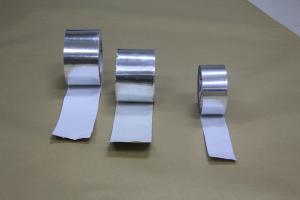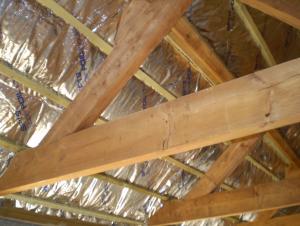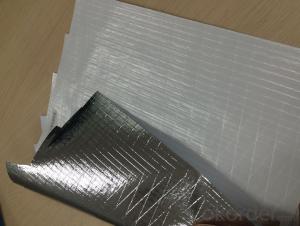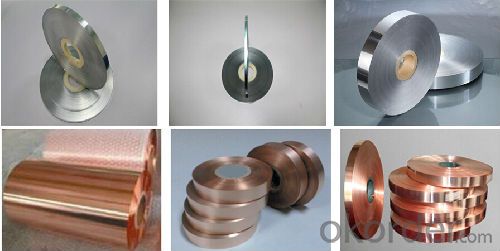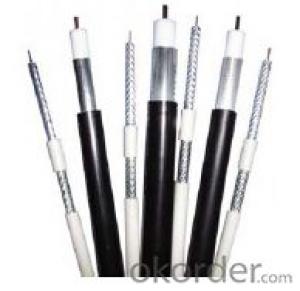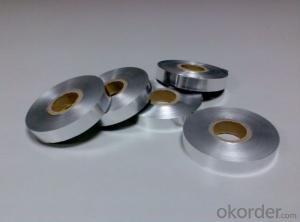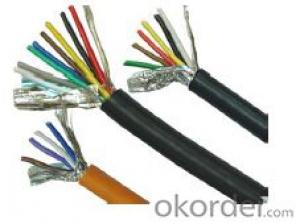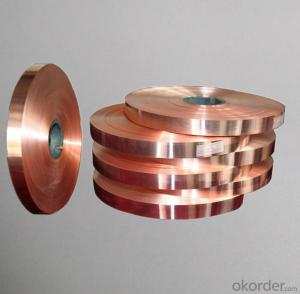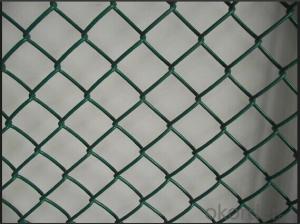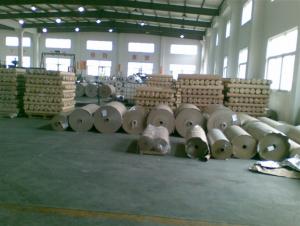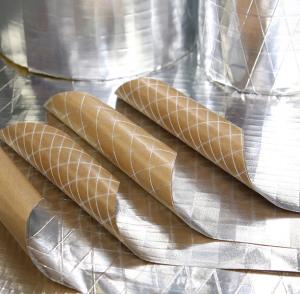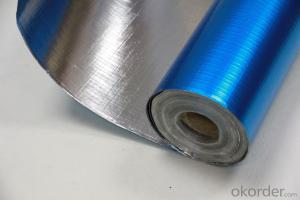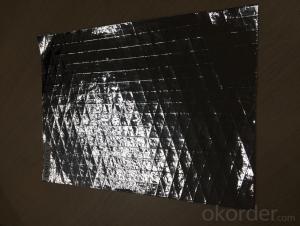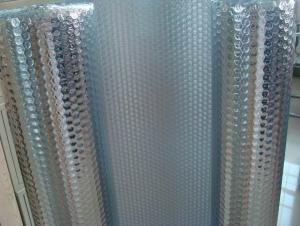Aluminum Foil Facing Shielded Copper Cable with Copper Foil
- Loading Port:
- Shanghai
- Payment Terms:
- TT or LC
- Min Order Qty:
- 1000 m²
- Supply Capability:
- 1000000 m²/month
OKorder Service Pledge
OKorder Financial Service
You Might Also Like
Aluminum Mylar foil Shielding Foil for Coaxial Cable communication cable
1.Structure of Aluminum Mylar foil Shielding Foil Description:
Electrical cable is used to transfer electricity, information and the realization of electromagnetic energy transformation. The electrical cable in a broad term mainly indicates to cable and in a narrow term indicate insulation material. Its definition is the aggregation of different parts below: one or more insulation cores, the wrapping layers of the cores, the general protective layers and the outer protective layers. Cables also include additive conductor without insulator.
2.Main Features of the Aluminum Mylar foil Shielding Foil:
Aluminum Mylar foil Shielding Foil is applicable to the shielding of coaxial cable, local network wire, electronic communication cable and computer peripheral wire etc.
1.Thickness: min 6.5mic; width: 300-1000mm.
2. According to GB/T 3198-2010.
3.Usages: cable shield, candy wrap
3. Aluminum Mylar foil Shielding Foil Images
4. Aluminum Mylar foil Shielding Foil Specification
AL-PET laminated foil
Description: Apply for overall or individual twisted pair shield for electronic cable and local network cables, protect from external electromagnetic interference. Features option of LUBRITAPE apply to decrease 50% friction of aluminum surface.
Construction: Aluminum foil, Polyester film
CODE | TOTAL THICKNESS | ALU THICKNESS | GLUE | POLYESTER FILM | WEIGHT |
FP007012 | 22±3 | 7 | 3 | 12 | 38.8±5% |
FP010012 | 25±3 | 10 | 3 | 12 | 46.9±5% |
FP020020 | 43±3 | 20 | 3 | 20 | 83.8±5% |
FP025012 | 40±3 | 25 | 3 | 12 | 87.6±5% |
Special specifications are also available, according to customer’s order. | |||||
AL-PET-AL laminated foil
Description: resilient shielding in cable assembling and provide the enhanced shielding required in harsh environments.
Construction: Aluminum foil +Polyester film+ Aluminum foil
CODE | TOTAL THICKNESS | ALU THICKNESS | GLUE | POLYESTER FILM | GLUE | ALU THICKNESS | WEIGHT |
DFP007015 | 35±3 | 7 | 3 | 15 | 3 | 7 | 65±5% |
DFP009020 | 39±4 | 9 | 3 | 15 | 3 | 9 | 76±5% |
DFP015025 | 61±5 | 15 | 3 | 25 | 3 | 15 | 115±5% |
DFP025025 | 80±5 | 25 | 3 | 25 | 3 | 25 | 175±5% |
Special specifications are also available, according to customer’s order. | |||||||
Bonded AL-PET laminated foil
Description: A laminated aluminum-polyester-aluminum tape is fully bonded to the foam dielectric to provide 100% coverage, longitudinally applied over the polyethylene core and the tape minimizes signal leakage.
Construction: Aluminum foil + Polyester film + Aluminum foil + EMAA film
CODE | TOTAL THICKNESS | ALU THICKNESS | GLUE | POLYESTER FILM | GLUE | ALU THICKNESS | GLUE | EMAA | WEIGHT |
DFPH009012 | 65±5 | 9 | 3 | 12 | 3 | 9 | 3 | 25 | 98±5% |
DFPH009020 | 72±5 | 9 | 3 | 20 | 3 | 9 | 3 | 25 | 108±5% |
DFPH009025 | 75±5 | 9 | 3 | 25 | 3 | 9 | 3 | 25 | 114±5% |
DFPH010025 | 84±5 | 10 | 3 | 25 | 3 | 10 | 3 | 25 | 126±5% |
Special specifications are also available, according to customer’s order. | |||||||||
Copper polyester foil
Description: Copper foil, copper lamination foil typically use as shielding for low/medium voltage cable and radio frequency coaxial cable. The rolled annealing copper foil is flexible to wrap cable core, also it has the excellent physical properties, Polyester film provides electrical insulation and high mechanical properties.
Construction: Copper foil + Polyester film
CODE | TOTAL THICKNESS | CU THICKNESS | GLUE | POLYESTER FILM | WEIGHT |
CP018012 | 33±3 | 18 | 3 | 12 | 175±10% |
CP007020 | 46±3 | 18 | 3 | 25 | 195±10% |
CP015012 | 30±3 | 15 | 3 | 12 | 160±10% |
Special specifications are also available, according to customer’s order. | |||||
5.FAQ
We have organized several common questions for our clients,may help you sincerely:
① Where you used this foil?
Aluminum Mylar foil Shielding Foil is used for cable shield, candy wrap for the shielding of coaxial cable, local network wire, electronic communication cable and computer peripheral wire etc.
②How to guarantee the quality of the products?
We have established the international advanced quality management system,every link from raw material to final product we have strict quality test;We resolutely put an end to unqualified products flowing into the market. At the same time, we will provide necessary follow-up service assurance.
③How long can we receive the product after purchase?
In the purchase of product within three working days, We will arrange the factory delivery as soon as possible. The pecific time of receiving is related to the state and position of customers.Commonly 7 to 10 working days can be served.
- Q: This question asks for methods to clean aluminum foil facing that has old food stains on it after cooking.
- <p>To remove old food stains from aluminum foil facing, start by scraping off any loose debris with a spatula or scraper. Then, soak the stained area in warm soapy water for about 15 minutes. Use a soft cloth or sponge to gently scrub the stains. For stubborn stains, make a paste of baking soda and water, apply it to the stain, and let it sit for a few hours before scrubbing. Rinse thoroughly with water. If stains persist, consider using a non-abrasive cleaner specifically designed for aluminum surfaces. Always test any cleaning solution on a small, inconspicuous area first to ensure it doesn't damage the surface.</p>
- Q: What are some suggestions to ensure plastic containers are used in a more hygienic and long-lasting manner?
- <p>To use plastic containers more hygienically and durably, follow these tips: 1) Always wash containers with warm soapy water and rinse thoroughly before and after each use. 2) Avoid putting hot foods or liquids directly into plastic containers to prevent warping and potential chemical leaching. 3) Do not use scratched or damaged containers as they can harbor bacteria and are more likely to break. 4) Store containers in a dry, cool place away from direct sunlight to prevent degradation. 5) Regularly inspect containers for signs of wear and replace them when necessary. 6) Use containers within their recommended temperature range to maintain their integrity and safety.</p>
- Q: Is it possible to create a pie crust using aluminum foil as a substitute for traditional pie crust materials?
- <p>No, you cannot use aluminum foil to make a pie crust. A pie crust is traditionally made from flour, butter, and water, which when combined and baked, create a flaky, edible crust. Aluminum foil is a metal material not meant for consumption and lacks the properties needed to form a pie crust. It does not have the ability to be rolled out, shaped, or baked into a flaky, edible form. Instead, it's used for wrapping food to retain moisture or for cooking on a grill.</p>
- Q: Describe the optimal method for utilizing aluminum foil facing in cooking.
- <p>The best way to use aluminum foil facing for cooking is to preheat your oven and ensure the foil is shiny side up to reflect heat. For baking, create a tent with the foil to protect delicate foods from direct heat, which can prevent burning. When roasting, use foil to wrap foods like fish or vegetables to steam them, enhancing flavor and moisture retention. For grilling, use foil to create packets to cook foods indirectly or to line the grill to prevent food from sticking. Always handle with care to avoid tearing and ensure even heat distribution.</p>
- Q: Is it possible to use aluminum foil with a reflective side to line a cake tin for baking purposes?
- <p>Yes, you can use aluminum foil facing to line a cake tin before baking. It helps in creating a smooth finish on the cake and can prevent sticking. However, ensure the foil is food-grade and does not have any sharp edges that could tear or puncture the cake. It's also important to grease the foil lightly to facilitate easy removal of the cake after baking.</p>
- Q: Is it safe to use aluminum foil facing to wrap food for transportation purposes?
- <p>Yes, you can use aluminum foil facing to wrap food for transporting. Aluminum foil is a common and safe material used for food packaging due to its ability to protect food from air, moisture, and bacteria. It also helps to maintain the temperature of the food, keeping it hot or cold as needed. However, ensure that the aluminum foil is food-grade and clean to prevent any contamination. Avoid using it in direct contact with acidic or salty foods as it may react and leach aluminum into the food, which is not recommended for consumption.</p>
- Q: Describe the optimal method for utilizing aluminum foil facing in culinary applications.
- <p>The best way to use aluminum foil facing in cooking is to preheat the oven to the desired temperature, then line the baking sheet or roasting pan with a sheet of aluminum foil, shiny side up. This helps prevent food from sticking and makes cleanup easier. When roasting meats or vegetables, you can also wrap them in foil to retain moisture and speed up cooking. Ensure the foil is not touching the heating elements to avoid fire hazards. For grilling, use foil to wrap foods like corn on the cob or to create a makeshift baking sheet for delicate items. Always be cautious with acidic foods as they can react with the aluminum.</p>
- Q: This question asks whether glass or ceramic containers are preferable for storing food over plastic or metal containers.
- <p>Glass and ceramic containers are often considered better for storing food due to their non-porous nature, which prevents the absorption of flavors and potential leaching of chemicals. Glass is generally safe for storing both acidic and alkaline foods, while ceramic containers should be checked for lead-based glazes, especially for acidic foods. Plastic containers can leach chemicals over time, and metal containers may react with certain foods, affecting taste or safety. However, the choice also depends on factors like the type of food, storage duration, and personal preference.</p>
- Q: What are the most suitable materials for creating aluminum foil facing?
- <p>The best materials for making aluminum foil facing are typically aluminum alloys, specifically 1100, 3003, or 8011 series alloys. These alloys offer excellent formability, corrosion resistance, and reflectivity, which are crucial for applications like insulation, construction, and heat management. Additionally, the facing material often includes a layer of polyester or polyethylene film to enhance durability and prevent tearing. The choice of material can also depend on specific requirements such as temperature resistance, UV resistance, and environmental conditions.</p>
- Q: This question asks for a method to create a facing made of aluminum foil.
- <p>To make your own aluminum foil facing, you'll need aluminum foil and a suitable adhesive. Start by cutting the aluminum foil to the desired size and shape. Apply a layer of adhesive to the back of the foil, ensuring it's evenly spread. Press the foil onto the surface you want to cover, smoothing out any bubbles or wrinkles. Use a knife or scissors to trim any excess foil. Allow the adhesive to dry completely before handling. This creates a reflective surface that can be used for insulation, decoration, or other purposes.</p>
Send your message to us
Aluminum Foil Facing Shielded Copper Cable with Copper Foil
- Loading Port:
- Shanghai
- Payment Terms:
- TT or LC
- Min Order Qty:
- 1000 m²
- Supply Capability:
- 1000000 m²/month
OKorder Service Pledge
OKorder Financial Service
Similar products
Hot products
Hot Searches
Related keywords
